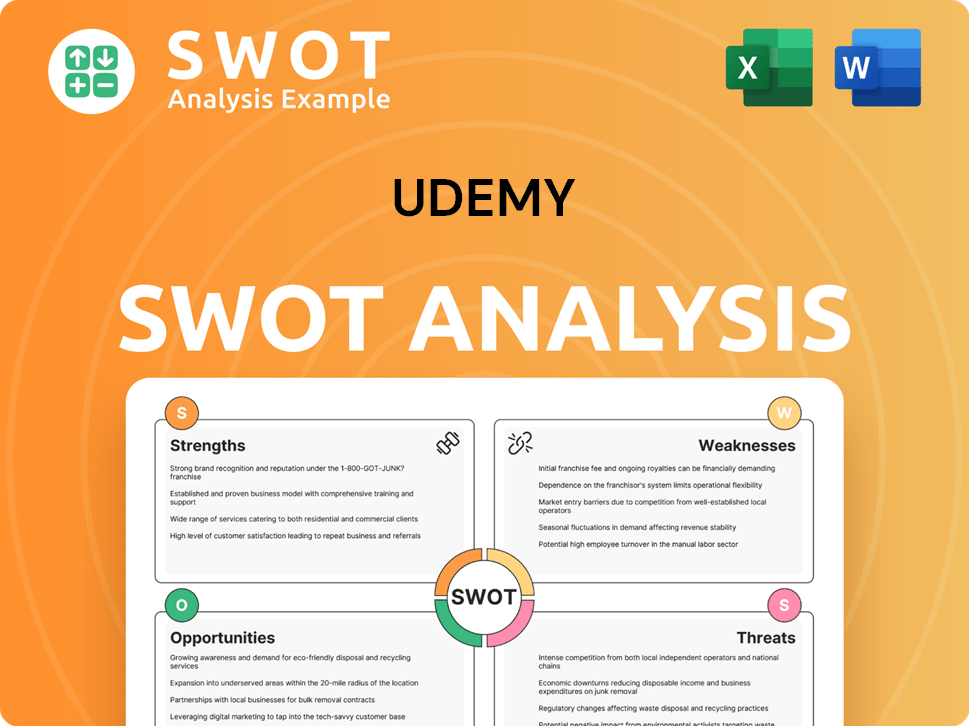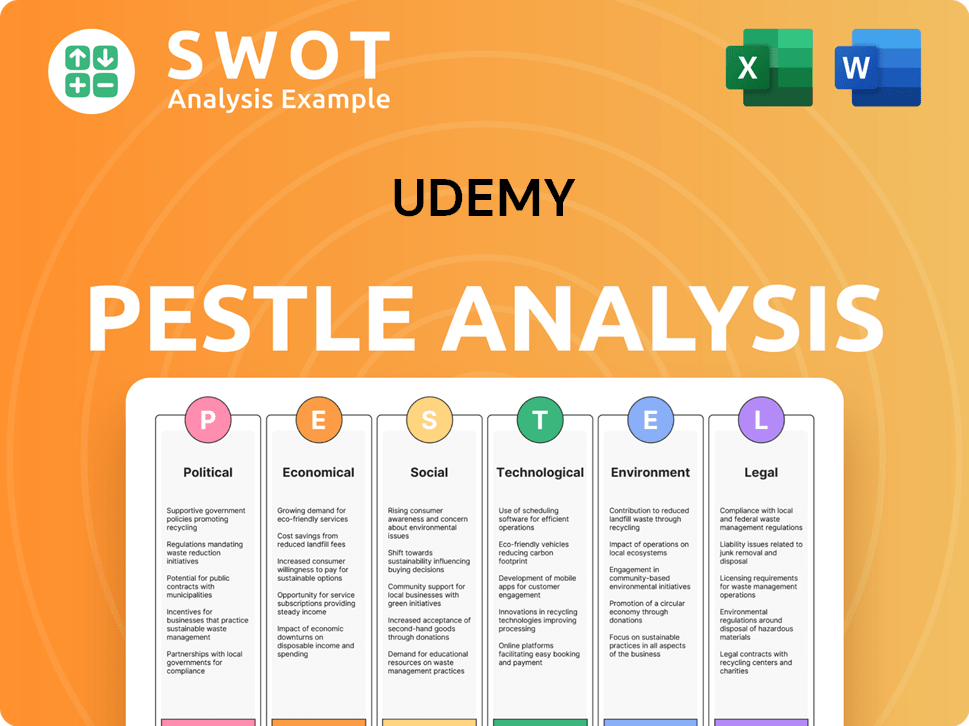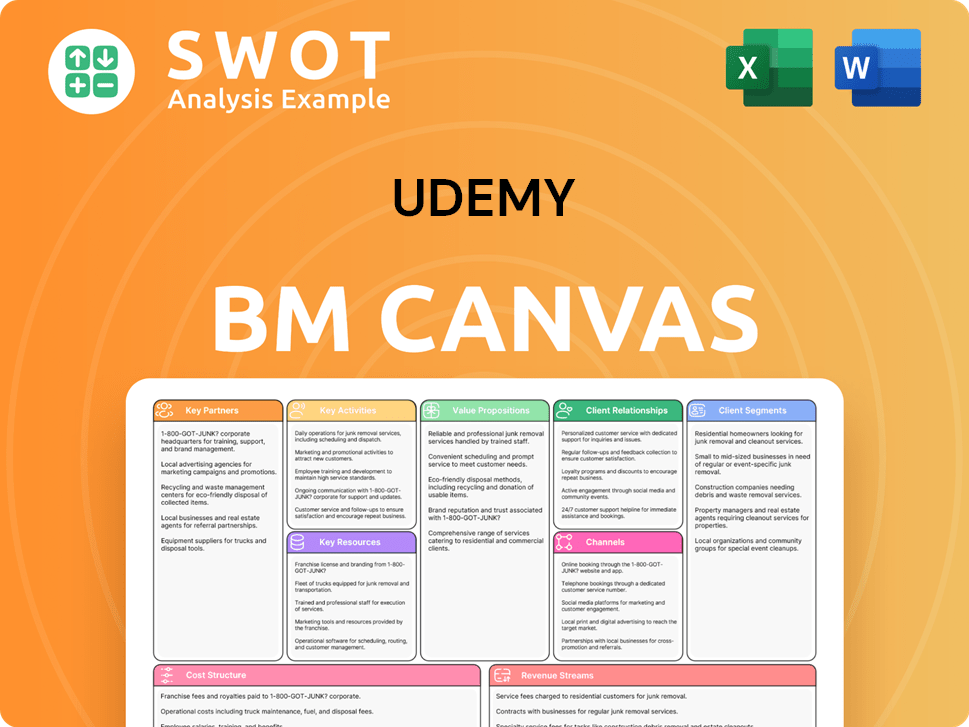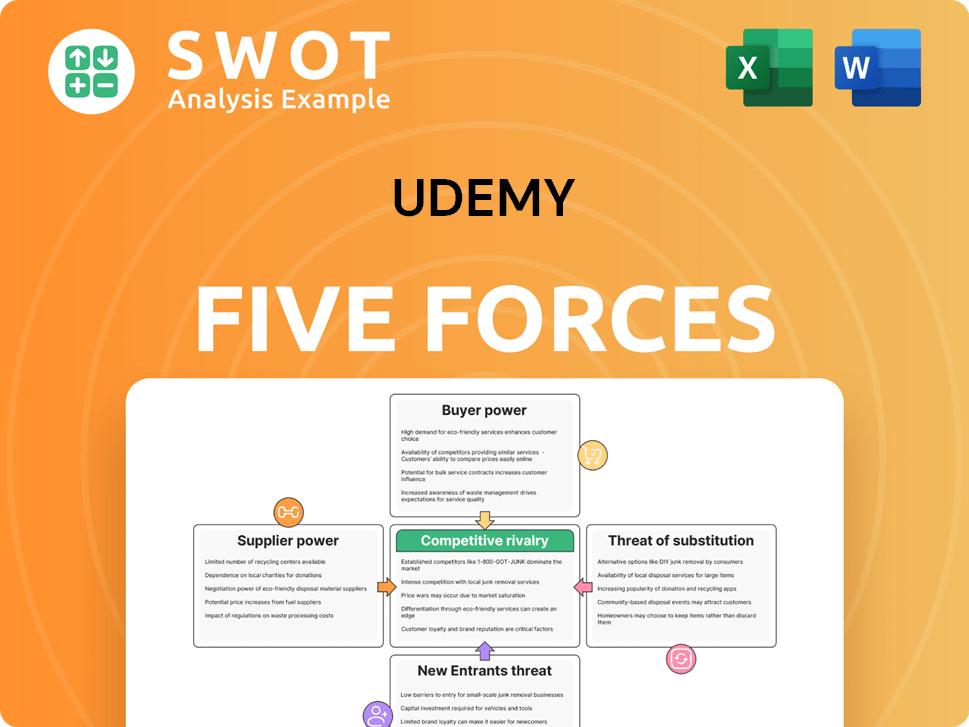Udemy Bundle
How Did Udemy Revolutionize Its Sales and Marketing?
Explore the dynamic transformation of Udemy, the online learning platform, as it pivots its Udemy SWOT Analysis to dominate the e-learning landscape. From its humble beginnings in 2010, Udemy has strategically shifted its focus, particularly in its Business-to-Business (B2B) segment, driving significant revenue growth. This strategic evolution has reshaped the company's trajectory and redefined its approach to the digital education market.

This analysis delves into Udemy's evolving Udemy sales strategy and Udemy marketing strategy, examining its shift from a consumer-focused online course platform to an enterprise-driven model. We'll unpack the Udemy business model, exploring how it leverages various sales channels, marketing tactics, and brand positioning to acquire users and generate leads. Understanding these strategies is crucial for anyone interested in e-learning marketing and the digital education sales landscape, including how Udemy acquires new users and its overall growth strategy.
How Does Udemy Reach Its Customers?
The sales strategy of the online course platform focuses on both individual learners (B2C) and businesses (B2B). The primary sales channel for the company is its online platform, where users can browse and purchase courses. This approach allows for a broad reach and direct engagement with potential customers.
The company's marketing strategy leverages digital channels to attract users. This includes search engine optimization (SEO), social media marketing, and content marketing to increase visibility and drive traffic to the platform. The e-learning marketing efforts are designed to engage potential customers and convert them into paying users.
The company's business model is built upon offering a vast selection of courses across various categories. This diverse content library, combined with effective sales and marketing tactics, helps attract a large user base. Understanding the Target Market of Udemy is crucial for tailoring sales and marketing efforts.
The Consumer segment utilizes the company's website as an e-commerce platform. Users can browse and purchase courses directly. In 2024, revenue from the Consumer segment reached $292.1 million.
The Udemy Business segment focuses on providing learning solutions to companies. Direct sales teams engage with enterprise customers. The B2B segment's revenue in 2024 was $494.5 million, showing an 18% year-over-year increase.
Partnerships expand reach in the B2B market. In 2024, partnerships included Ingram Micro for India and WorkRamp for reseller agreements. A partnership with FPT, supported by FUNiX, enhances human resources development in Vietnam.
Technology partnerships boost enterprise customer engagement. The company added nearly 1,400 net new Enterprise customers in 2024. The total number of enterprise customers reached 17,096 by the end of 2024.
The company's sales strategy is multifaceted, including direct sales, partnerships, and an e-commerce platform. The focus on both B2C and B2B segments allows for diversified revenue streams and market penetration. Understanding the nuances of digital education sales is key to success.
- Direct sales teams targeting enterprise clients.
- Strategic partnerships to expand market reach.
- E-commerce platform for individual course purchases.
- Technology partnerships to enhance customer engagement.
Udemy SWOT Analysis
- Complete SWOT Breakdown
- Fully Customizable
- Editable in Excel & Word
- Professional Formatting
- Investor-Ready Format

What Marketing Tactics Does Udemy Use?
The company employs a diverse range of marketing tactics to build awareness, generate leads, and drive sales, with a significant focus on digital strategies. Their approach includes content marketing, search engine optimization (SEO), paid advertising, influencer marketing, and email marketing. This multi-faceted strategy aims to reach a broad audience and encourage course enrollments.
A key aspect of the company's marketing strategy involves leveraging data to personalize and target advertising campaigns effectively. They also actively integrate AI-powered features to enhance learner experiences and support content creation. This data-driven approach is crucial for understanding user behavior and optimizing marketing efforts.
The company's marketing mix has evolved, with a clear shift towards enterprise solutions. The focus is on addressing the growing demand for skills development within organizations. This strategic pivot reflects a broader trend in the e-learning market towards providing tailored solutions for businesses.
Content marketing is a cornerstone of the company's strategy, with its vast library of courses serving as valuable content. This approach helps attract potential students and establish the platform as a resource for learning. The courses themselves are the primary content, driving organic traffic and engagement.
SEO is emphasized by optimizing course titles and descriptions with relevant keywords to enhance visibility in search results. This strategy aims to improve the platform's ranking in search engine results pages (SERPs), making it easier for potential students to find courses. Effective SEO is crucial for organic user acquisition.
Paid advertising is utilized across various platforms, including social media channels like Facebook, Instagram, LinkedIn, and Twitter. This targeted marketing helps reach specific demographics, interests, and behaviors. Social media campaigns are designed to increase brand awareness and drive conversions.
The company leverages influencer and affiliate marketing campaigns, partnering with social media personalities, bloggers, and industry experts. This strategy taps into existing follower bases to promote courses and increase reach. Influencer marketing helps build trust and credibility.
Email marketing is a key tactic for nurturing leads and keeping learners informed about new courses, promotions, and updates. Personalized email campaigns are used to re-engage users and encourage course enrollments. This direct communication channel is essential for driving repeat business.
The company's approach to data-driven marketing is evident in its ability to segment audiences for targeted and personalized advertising campaigns. The company has also been strategically advancing in AI-powered learning, launching features like AI-powered Skills Mapping, which over 1,800 enterprise customers have leveraged since November 2024. This integration of AI aims to improve learner personalization and support content creation.
The company's marketing strategy is designed to support its business model and growth. The evolution of the marketing mix reflects a clear shift towards enterprise solutions, with the company Business focusing on addressing the growing demand for skills development for enterprises. Understanding the Brief History of Udemy can provide deeper insights into its marketing evolution.
- The company's Udemy sales strategy and Udemy marketing strategy are heavily reliant on digital channels.
- E-learning marketing efforts are targeted, leveraging data to personalize campaigns.
- The company's Udemy business model is evolving to cater to enterprise clients.
- Udemy's content marketing strategy is central, with courses serving as key content assets.
Udemy PESTLE Analysis
- Covers All 6 PESTLE Categories
- No Research Needed – Save Hours of Work
- Built by Experts, Trusted by Consultants
- Instant Download, Ready to Use
- 100% Editable, Fully Customizable

How Is Udemy Positioned in the Market?
The core of the Udemy's brand positioning is its identity as a leading online skills marketplace. It focuses on transforming lives through learning, offering access to the latest and most relevant skills. The platform's message emphasizes empowering individuals and organizations, particularly in the context of generative AI.
Udemy differentiates itself through a diverse course catalog, a user-friendly platform, and affordable pricing, especially for individual learners. This approach makes learning accessible and flexible, supporting a commitment to lifelong learning. The company's brand identity is consistently maintained across all channels, from its website to its mobile app and partnerships.
Udemy's appeal lies in its wide array of subjects, spanning technical skills like coding and data analysis to soft skills such as leadership and communication. This comprehensive approach ensures that Udemy caters to a broad audience seeking to enhance their skills and knowledge. Udemy's focus on providing accessible, flexible, and relevant learning experiences is a key element of its brand strategy.
Udemy's sales strategy emphasizes acquiring and retaining both individual learners and corporate clients. The Udemy sales strategy involves promoting a vast course catalog and user-friendly platform to attract learners. It also focuses on building relationships with businesses to offer customized learning solutions.
The Udemy marketing strategy leverages digital marketing techniques to reach its target audience. This includes content marketing, social media engagement, and search engine optimization (SEO). Email marketing and affiliate programs also play a crucial role in driving user acquisition and engagement.
E-learning marketing tactics utilized by Udemy include targeted advertising on platforms like Google and social media. Content marketing, such as blog posts and webinars, educates potential learners about the benefits of online courses. SEO strategies are employed to improve search visibility.
Digital education sales at Udemy involve personalized recommendations and promotional offers to attract and retain users. The platform uses data analytics to understand user behavior and tailor its sales efforts. Partnerships with educational institutions and corporations also boost sales.
Udemy's brand positioning is built on several key elements that contribute to its success in the online course platform market. These elements help define its identity and appeal to its target audience.
- Accessibility: Udemy offers a vast library of courses at various price points, making learning accessible to a broad audience.
- Flexibility: The platform allows learners to study at their own pace and on their schedule, enhancing convenience.
- Relevance: Courses are updated regularly to reflect current industry trends and demands, ensuring relevance.
- Diversity: A wide range of subjects, from technical skills to soft skills, caters to diverse learning needs.
- User-Friendly Platform: The platform's ease of use enhances the learning experience.
Udemy Business Model Canvas
- Complete 9-Block Business Model Canvas
- Effortlessly Communicate Your Business Strategy
- Investor-Ready BMC Format
- 100% Editable and Customizable
- Clear and Structured Layout

What Are Udemy’s Most Notable Campaigns?
The sales and marketing strategy of the company has been significantly shaped by its focus on the enterprise market, particularly through Udemy Business. This strategic shift is a primary 'campaign' designed to drive substantial and recurring revenue. The emphasis is on establishing the company as the premier skills development platform for organizations and professional learners. This approach is critical for long-term growth and sustainability in the competitive online education landscape.
Another critical component of the company's strategy involves leveraging technological advancements, specifically AI. The integration of AI-powered features, like Skills Mapping, enhances the learning experience and supports content creation. Furthermore, strategic partnerships and endorsements play a crucial role in boosting brand visibility and market share. These combined efforts highlight a comprehensive approach to sales and marketing, focusing on both technological innovation and strategic alliances.
The company's ongoing initiatives reflect a clear focus on the enterprise market and leveraging technology to drive growth, even as the consumer segment faces headwinds. This strategic direction is supported by data showing Udemy Business contributing significantly to the company's revenue. The company’s ability to adapt to market demands and leverage technological advancements positions it well for continued success. For more insights, consider Growth Strategy of Udemy.
The primary sales and marketing campaign centers on Udemy Business, targeting enterprise clients. This strategy aims to secure recurring revenue streams and establish the company as a leading skills development platform for businesses. This shift is critical for adapting to the evolving e-learning market.
The integration of AI-powered features, such as Skills Mapping, is a key marketing initiative. This technology enhances personalized learning and supports content creation, aiming to transform the platform. This initiative demonstrates a commitment to innovation and user experience.
Partnerships, such as the one with Ingram Micro, are crucial for market expansion and brand visibility. These collaborations aim to increase Udemy Business's market share and reach. These initiatives are a key component of the overall Udemy sales strategy.
Being recognized by TIME as a top EdTech company in 2024 and winning the 2024 Human Capital Management Digital Innovation Award are significant marketing achievements. These endorsements boost brand credibility and act as public relations campaigns. These awards highlight the company's industry leadership.
Udemy Business accounted for 60% of the total revenue in 2024. This is a significant increase from 18% in 2019, demonstrating the success of the enterprise-focused strategy. The company anticipates Udemy Business to reach 75% of total revenue in the coming years.
Since November 2024, over 1,800 enterprise customers have used Udemy's AI-powered Skills Mapping feature. More than one-third of learning paths created by these customers utilize this tool. This highlights the adoption of AI within the platform.
Collaborations with companies like Ingram Micro and WorkRamp contribute to brand visibility. These partnerships facilitate market expansion and increase access to Udemy Business. These efforts are crucial for customer acquisition.
Inclusion in TIME's list of top EdTech companies in 2024 serves as a strong endorsement. Winning the 2024 Human Capital Management Digital Innovation Award further validates the company's market position. These accolades boost brand reputation.
The strategic shift towards the enterprise market is a central sales and marketing strategy. This approach aims to secure recurring revenue and establish the company as a leading skills development provider. This ensures long-term growth.
While the enterprise segment thrives, the consumer segment faces challenges. This highlights the importance of the company's strategic focus. The company's adaptability is key to its success.
Udemy Porter's Five Forces Analysis
- Covers All 5 Competitive Forces in Detail
- Structured for Consultants, Students, and Founders
- 100% Editable in Microsoft Word & Excel
- Instant Digital Download – Use Immediately
- Compatible with Mac & PC – Fully Unlocked

Related Blogs
- What are Mission Vision & Core Values of Udemy Company?
- What is Competitive Landscape of Udemy Company?
- What is Growth Strategy and Future Prospects of Udemy Company?
- How Does Udemy Company Work?
- What is Brief History of Udemy Company?
- Who Owns Udemy Company?
- What is Customer Demographics and Target Market of Udemy Company?
Disclaimer
All information, articles, and product details provided on this website are for general informational and educational purposes only. We do not claim any ownership over, nor do we intend to infringe upon, any trademarks, copyrights, logos, brand names, or other intellectual property mentioned or depicted on this site. Such intellectual property remains the property of its respective owners, and any references here are made solely for identification or informational purposes, without implying any affiliation, endorsement, or partnership.
We make no representations or warranties, express or implied, regarding the accuracy, completeness, or suitability of any content or products presented. Nothing on this website should be construed as legal, tax, investment, financial, medical, or other professional advice. In addition, no part of this site—including articles or product references—constitutes a solicitation, recommendation, endorsement, advertisement, or offer to buy or sell any securities, franchises, or other financial instruments, particularly in jurisdictions where such activity would be unlawful.
All content is of a general nature and may not address the specific circumstances of any individual or entity. It is not a substitute for professional advice or services. Any actions you take based on the information provided here are strictly at your own risk. You accept full responsibility for any decisions or outcomes arising from your use of this website and agree to release us from any liability in connection with your use of, or reliance upon, the content or products found herein.